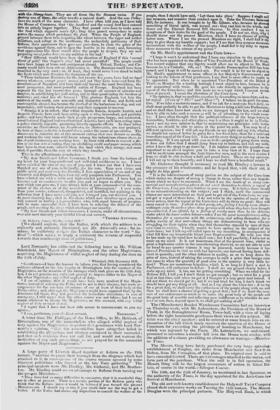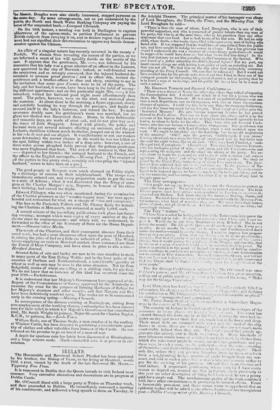A large party of Liberals dined together at Ashton on
the 19th instant, " anxioue to tonere their borough from time disgrace which had attached to it, in coeseoneeee of the coarse treason spouted by some itinerant politicians who figured ut the late Tory gathering." The principal speakers were Mr. 1 linflley, Mr. Gisborne, and Mr. Brother- ton. Mr. Hindley could see no advantage to Reform from turning out the prevent Ministers-- "They have had so many difficulties to encounter, that it is wonderful they are in office at present. There is it certain portion of the Reform party who think that the Reform interest would be bettered if you turned the ',resent Ministers out. I should say so too, if' you could show Inc the way to get better. If the Tories had thowi, any diepositiou to commit the welfare of the peciplee then I should have said, • Let them take place.' 1. Suppose i sin& ati1 one measure, and consider- their conduct.upon it. Take the Met:tarsi:Immoral Bill; for iestattee, • It ,Was brought in by Mr. Gibson, wIni,,becausa.he showei sometlithi of liberal. spirit, was turned out : they cestlfine to the, win le, threw out the Electors Removal Bill likewise, In that conduct I ay), no symptoms of their desire for the good of the people. I do not see, then, why 1 should: throw out the present Ministers; when I. have do chance of 'getting better Men. Where I see the present Ministers are right, I shall feelitniy duty to give them my humble support ; but if I see that they peopiese•Mckeutes inconsistent with the welfare of the people, I shall feel it my duty to oppose those measures to the utmost of my power."
On Mr. Sheil's appointment and the Corn-laws-
"I hope it won't.he understood that I have any objection to the. gentleman who has been appointed to the office of Vice-President of the Board of Trade. You cannot suppose that any bigotry' would allow me to object to Mr. Sheil because he is a Catholic. Olt, no I The Catholic Emancipation Bill has been passed, and I hope it will bo carried out. Far would it be for me to object to Mr. Sheil's appointment to sonic offices in her Majesty's Government ; and looking to the talents of that gentleman, I say that to some office he might to he appointed. But when he is appointed Vice-President of the Beard of Trade, as Member for a trading borough I must object to him, because he is not acquainted with trade. He gave his vote directly in opposition to the repeal of the Corn-laws ; and this leads me to a topic which I cannot shrink
from at present. I mean the alteration of the Corn-laws. * * *
"My opinion is, that we peril the question by demanding an immediate and to- tal repeal. ( Cries of " No!" and" Bear !") I believe we do peril the ques- tion. If we take a moderate course, and if we ask for a moderate fixed duty, we shall most probably be able to get the Miuisters to bring a bill into Parliament ; and we shall then know how much we are damaged by this law, and we shall then be able to take such a course as will he of damaged to the whole coun- try. I have often thought that the political influence ought the large towns in Lancashire Yorkhire, and other places, was le:;s than it ought to be in Parlia- ment ; and own opinion is, that by maintaining our principles with better tactics, we should be ruble to arrive at the point we seek. You may he of a different npiniou; but I will ask my friends on toy right and my left, whether we should not succeed better by going for it low fixed duty, than for a total and immediate repeal of the Corn-law. 1 mini not for every thing or nothing, I am for something. If I am agreed with you as to the propriety of going down stairs, it does not follow that 1 should jump from top to bottom, and risk my neck, when I have the steps to go down by. I do implore you oir this question—so important to its all-1 implore you to take a wise view of it. I hope there will lie no division amongst the Anti-Corn-law men, and in the next session I hope we shall be able to show a bold and proud front. These are my opinions. I will act up to them honestly, and I hope we shall have a beneficial result."
Mr. Gisborne thought it necessary to read Mr. Hindley a lecture in the presence of his constituents ; and he hoped that, with their aid, it might do him good-
" It is the lukewarnmess of many parties on the subject of the Corn-laws which makes me despair of seeing a change in them, rather than any impedi- ments which we have to encounter. When I see the heads of so many com- mercial and meninficturing places do not crest themselves to obtain a repeal of the Corn-laws, I say you have traitors in your camp. It is better there should be no misunderstanding. on the subject; and I think, until the commercial classes are more determined on their part to get rid of the Corn-laws, we can- not get a repeal of those laws. 1 do not refer to the opinion of manv of the lower orders, that the repeal of the Corn-laws will du them no good: they will come round in time. I allude to that party, who, .tteliny I hardly knw o what— wishing to raise themselves above those persons with whom they have been brought up—actuat,d, I am afraid, by a .feeling of vanity »lore than by the delnsioa under which the lower orders labour—when I see the great manufacturers selling themselves finr a connexion with the aristocracy, and selling themselves for a paltry vanity of that sort—these things are disheartening to foul who are struggling for their rights, when they find themselves opposed by men of their
i
OW11 class n society. 1 hardly meant to have spoken on the subject of the Corn-laws; but 1 felt myself called upon to say something, in consequence of what fell from my, honourable friend your Representative. He tells you that he has made up his mind how he shall vote ; but I tell you fairly, I have not so made up my Mind. Is it not monstrous, that at the present time, whilst so great a depression exists in the manufacturing districts, we are not able to send for bread to any quarter whence it any be procured, merely because it has pleased Providence to visit ems with bad harvests, one harvest having been defi- cient in quantity, nntl the other deficient in quality, so as to keep down the price of corn, instead of raising the averages to such a price that foreign corn can come in when the quantity of good corn in the country is very little in- deed ? These are monstrous iniquities, which I, so long as I have a seat in Parliament, will endeavour to deti:at. I shall see 111'y ground clearly before I make up my mind. I, too, am for getting something. When we tried for the Reform Bill, I tell you I don't think we got enough; but we tried for a great deal at that time, and when we got it I thought it is very great deal indeed. I did not think we should get it ; but it' we had tiled for less, 1 don't think we should have got any thing at And so I say about the dorn-law : if we try for a great deal, we shall carry the enthusiasm of the people along with us, and then we shall have a chance of getting a great deal ; but if we limit the mea- sure of our endeavours so much us to make thereat body of the people and the great body of sensible and reflecting men indifferent as to whether we sac • ceed- or not, then, depend upon it, we shall get nothing at all."
The (Manchester) Bonded Warehouses Committee had no interview on Thursday week, with Mr. Labouchere, the President of the Board of Trade, in the Boroughreeves' Room, Town-hall, with a view of laying before the right honourable gentleman their views on this subject. Mr, GM was the chief speaker ; and he mitered at some length into an ex- planation of the bill which lately received the sanction of the House of Commons for extending the privilege of bonding to Manchester, but which was rejected by the Peers, Mr. Laboueltere, we understand, promised to introduce a similar bill into the House next session, with the addition of a clause providing an allowance on wastage.—Manches- ter Times.
The Messrs. Greg have lately purchased the very large spinning- establishment at Ringley, six miles from Manchester and four faun Bolton, from Mr. Crompton, of that place. Its original cost is said to have exceeded 60,0001. There are140 cottages attached to the works, and form part of the purchase. When the mill is in full operation, the Messrs. Greg will be the largest consumers of cotton in Great Bri-
taill, of course in the world.—Glasgow Courier. • • The 13th, not the 15th of Jimmy, as mentioned in last Spectator, on the authority of the Times, is the day appointed for the Anti-Corn-law
festival at Manchester. • The old and well-known establishment the Holywell Twist Company .closed their extensive works on Tuesday the Ilth Instant. The .igessre. Douglas were the principal partners. The Holy well Bank, in whittle
the gessrbs.Donglas were also chiefly . interested, stopped payment on thesantesdays..' some arrangements, not as yet understood by the public, the North. and South Wales Banking Company are paying the imtee of the suspended bank.—Liverpool Chronicle.
,• On the 18th instant, a meeting was held in Darlington to express' abhorrence of the opium-trade, to petition Parliament to prevent British subjects from carrying it on, and to declare regret that Govern- ineut had not signified their determination to oppose any hostile demon- stration against the Chinese.























 Previous page
Previous page